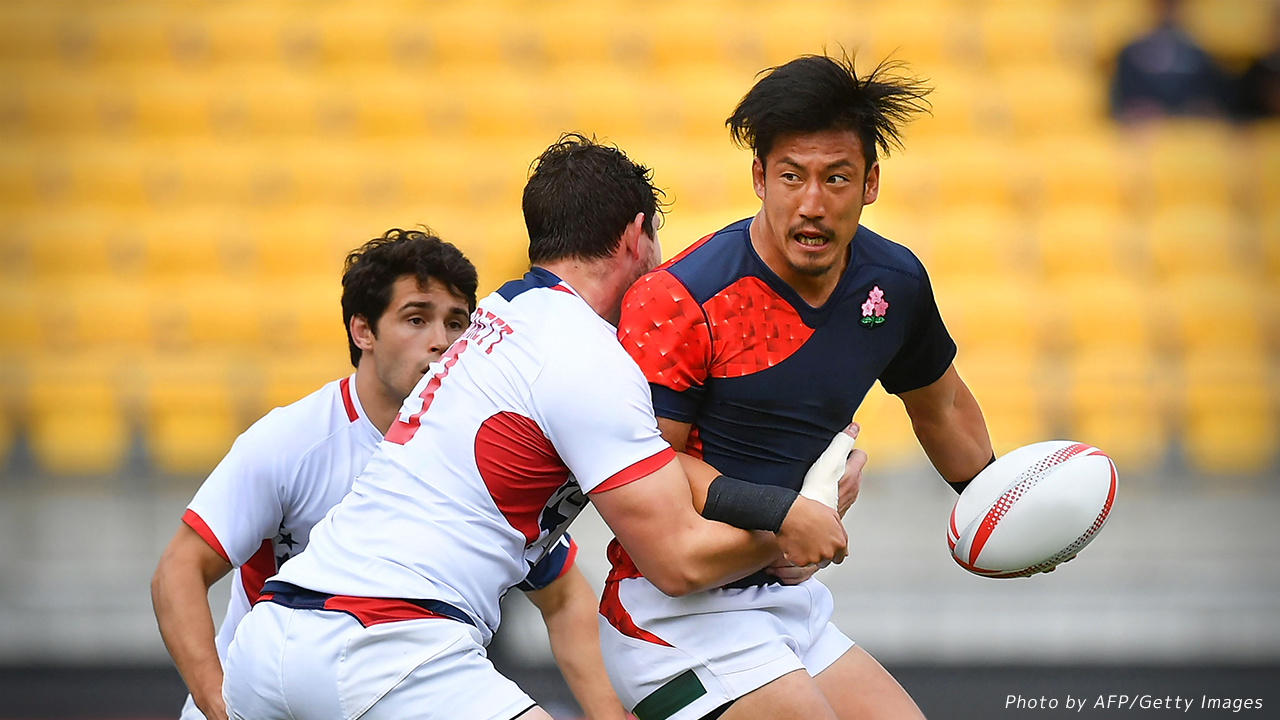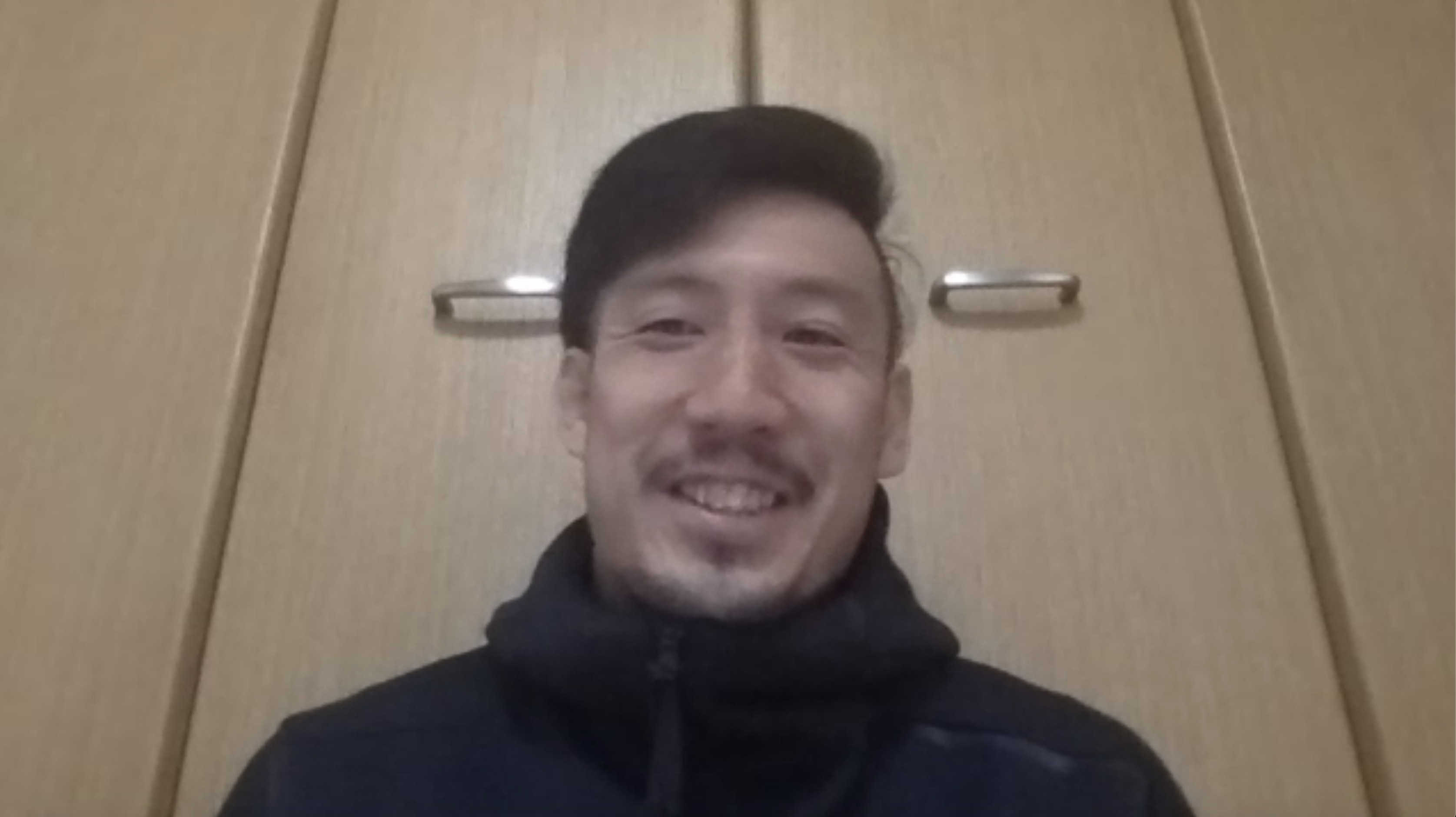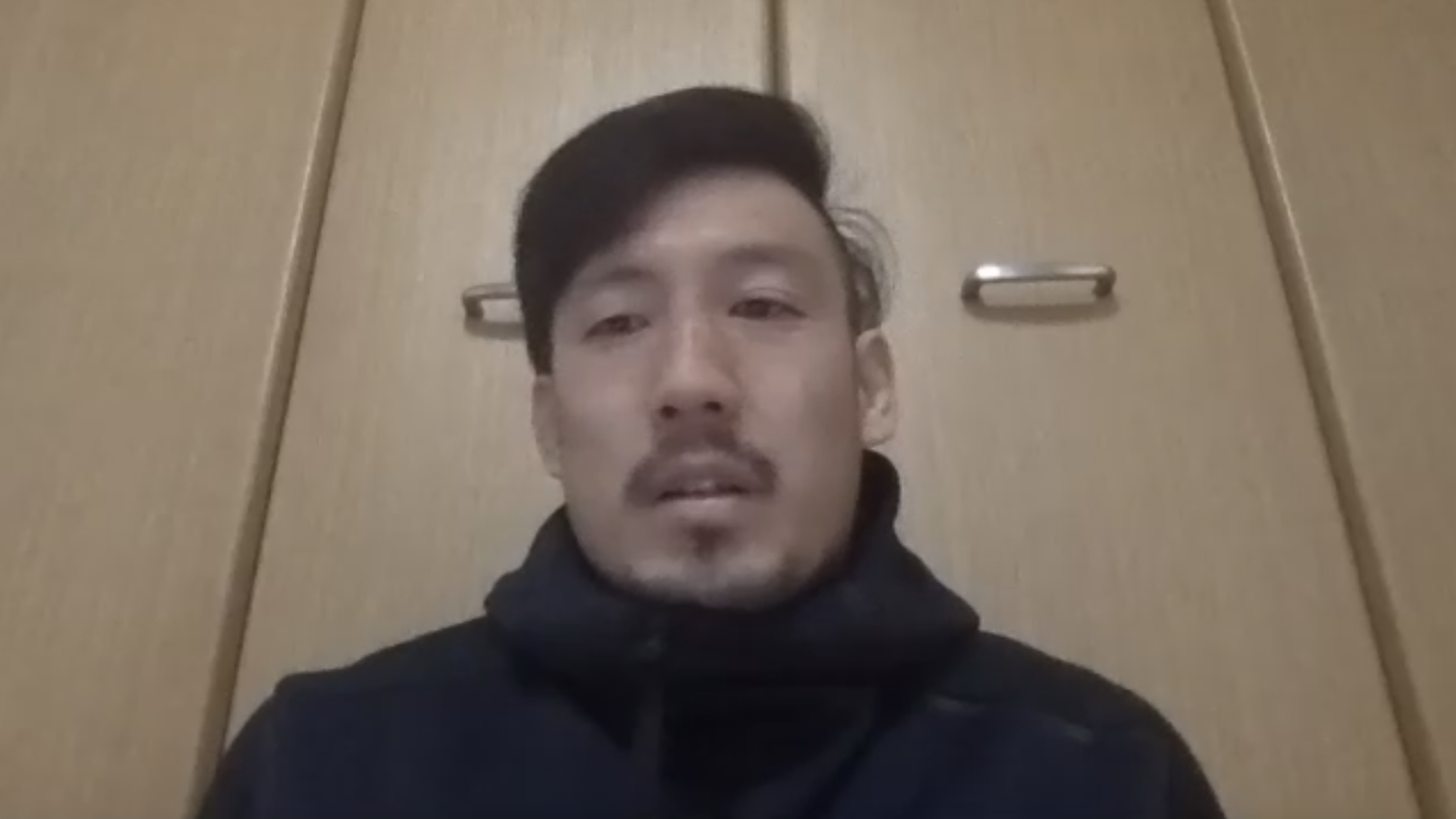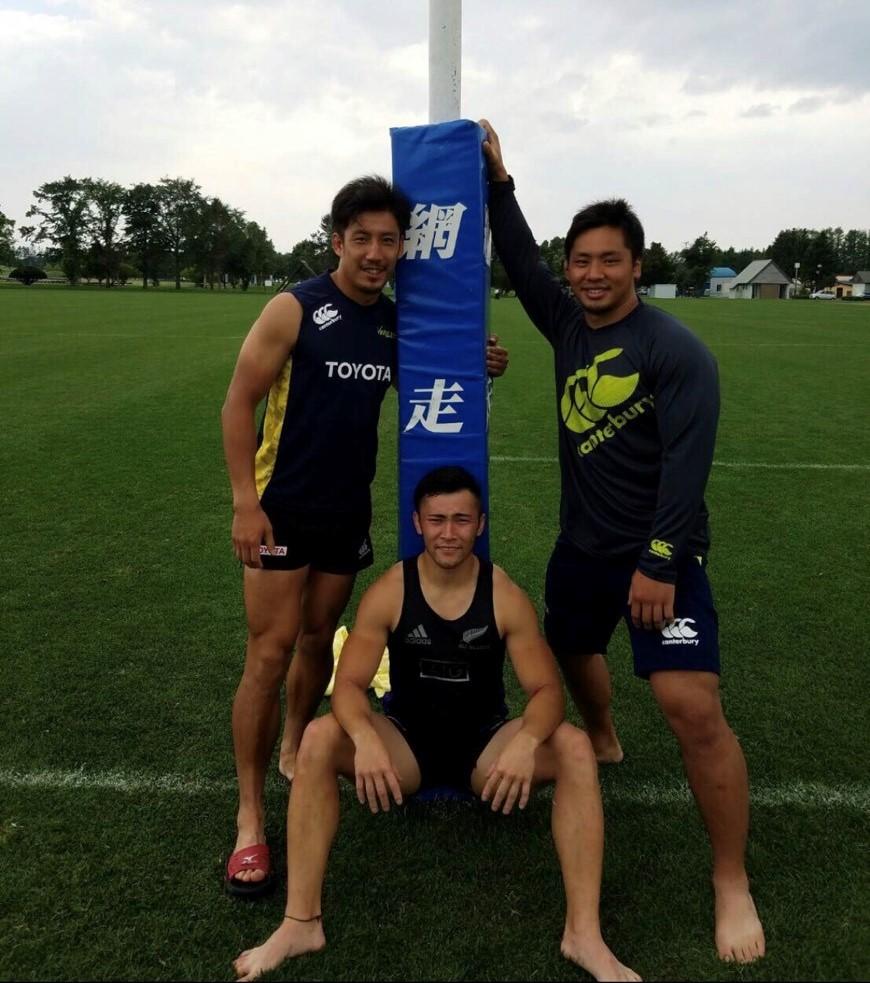
Gratitude to teachers, family, teammates, and a company that understands his devotion to rugby sevens, and thoughts on a path to tomorrow.

Athletes stand on the podium with the crowd cheering and cameras flashing. But they don’t make that happen just by themselves. Various people, from coaches, friends, colleagues, rivals, to families provide them with support, and behind a success or struggle, there are many different stories for each athlete. This athlete series highlights what enables athletes to take on challenges.

Only words of gratitude for both company and team
The outstanding performance and advance of the Japan National Team in the Rugby World Cup Japan 2019 sparked rugby fever throughout Japan. Dai Ozawa is one of the people selected to represent Japan as a member of the national rugby team at the Olympic Games Tokyo 2020, scheduled to take place this summer.
Before going any further, a little bit of explanation is needed. In contrast to the Rugby World Cup, where teams of 15 players competed, the rugby event at the Olympic Games is seven-a-side rugby, known as “rugby sevens.” Although some players compete in both the 15-a-side and seven-a-side games, Ozawa decided to concentrate exclusively on sevens. Then in 2018 he concluded an exclusive contract with the Japan Rugby Football Union (JRFU) as a member of the rugby sevens national team. He is currently on dispatch from Toyota to JRFU and is training actively with the rugby sevens national team in the hope of winning a medal at Tokyo 2020.

“I only have words of gratitude for my company that so kindly sent me out to represent Japan, and also for my team,” says Ozawa, who continued by looking back on the reasons behind his decision to concentrate on rugby sevens.
Ozawa
I failed to make the national team for the Olympic Games Rio 2016, leaving me feeling very regretful. Back then the national team ended up in fourth place at Rio 2016. I was delighted that Japan had achieved such a great result, but I also wished strongly that I could have been with the team in Rio 2016.
Personally, I felt it would be difficult to balance playing both sevens and 15-a-side and as the national sevens team also has a policy of encouraging players to focus their energies on sevens, I decided to conclude a contract with JRFU.
Ozawa then re-emphasizes the gratitude he feels, saying again, “Without the understanding of my team and my company it would be virtually impossible to leave on dispatch to concentrate totally on sevens, so I am really fortunate to be in such an environment.”
What is apparent from Ozawa’s words is that he has always played with a sense of appreciation to those around him. That is something that he has carried with him right from when he started playing up until today.
Being able to continue with rugby was entirely thanks to family’s support
Rugby has always been a part of Ozawa’s family, as he says that his father and elder brother also played the sport. It was therefore an entirely natural progression to join a rugby school when he was in elementary school.
On Saturdays I would join the junior athletics practice and on Sunday it would be rugby academy, but at some point I shifted over to rugby. I was born and raised in Gifu Prefecture and in comparison to Tokyo and Osaka there aren’t many rugby academies and it’s not viewed as a major sport. Even so, I always played at the back and found it really enjoyable to score tries to help the team win, so that is probably why I ended up preferring rugby to athletics.
However, there was no rugby club at his junior high school.
I was living in Gifu City and unless I went to a junior high school in neighboring Seki City there was no rugby club. Therefore, after class I got on the train to go to practice and in the evenings my parents would come to collect me. It takes about 40 minutes by car to Seki City and practice also took place on the weekends, so it is thanks to my parent’s support that I was able to continue playing rugby.

First setback after years of plain sailing
After graduating from junior high school Ozawa moved to Gifu Technical High School where he became a regular team member from the first year.
Mr. Tanaka, who had also taught my father and older brother, was in a position similar to general manager and below him was Mr. Tokushige, who was the coach when I joined the team. It was partly due to these family ties that I chose to advance to Gifu Technical High School.
From my first year I took part in matches and senior students were very supportive in helping me to push myself and improve my game, so that even now, when looking back I can still appreciate what a good team lineup we had back then.
In the winter of my first year we were all thrilled when the school was able to advance to the National High School Rugby Tournament known as “Hanazono”, the name of the stadium it took place in. It was really awe-inspiring to be able to play a match at the Hanazono main ground.
However, that first year was the only time for the team to advance to the Hanazono. Ozawa says that he still clearly remembers the disappointment of his third year when he was appointed captain of the team, only for the team to lose in the semi-finals of the national tournament.
As we had gone through to the Hanazono in my first year there were expectations that we could do it again, but perhaps one of the reasons our team didn’t make it was because I was still not ready as captain of the team.
As the word “captaincy” might suggest, the role of team captain in rugby is a particularly challenging one. This is because in rugby, once the match has started, the manager and coach can’t make any kinds of gestures or signs to players to change tactics during the match. It is only being able to communicate with teammates on the pitch and having to make various decisions yourself that makes the role of rugby team captain so challenging.
Ozawa would subsequently go on to captain the Japan rugby sevens national team. It is likely that the bitter experience in his third year in high school helped him on his journey.

“I couldn’t do such tough training if I was doing it alone”
Before graduating from high school Ozawa received invitations from several universities. From among them, one of the reasons why he chose Ryutsu Keizai University was because he wanted to play in the top league in East Japan. Another reason was also that he had been impressed by what he refers to as the “pick-up lines” of Ryutsu Keizai’s rugby coach Tatsuji Uchiyama.
Coach Uchiyama made a point of coming to the Gifu Technical High School rugby ground to talk to me, telling me that he would make me a member of the Japan national team. Believing his words, I made the decision to enroll at Ryutsu Keizai University.
In Ozawa’s third year the team placed second in the league under Coach Uchiyama’s supervision, and so his final year at university dawned.
The atmosphere in our team at that time was really great. Although the training was tough and we all ran hard, we were all lucky to have such good teammates who supported each other. I couldn’t have done such tough training if I had been alone and it was our spirit of togetherness that led us to win the league championship for Ryutsu Keizai University. The memories of that time will stay with me for a lifetime.

Although he might have had feelings of regret about his team’s performance in high school, Ozawa achieved the perfect comeback in university. So with his first league championship victory in the bag, Ozawa left the world of education and joined the workforce.
“I was grateful to have the support of everyone at work”
I had always thought that I would like to join a company close to home in Gifu, so I was thrilled when I was approached by Toyota Motor Corporation. The team is home to many famous players older than me, so I was really looking forward to playing with them.
In all his transitions, first from elementary to junior high school, then from junior high to high school, high school to university, and finally from university to adulthood, Ozawa says that he keenly felt the biggest step up was when he joined Toyota.
Although players from all around Japan gathered at Ryutsu Keizai University, in the case of Toyota all the players there could easily be chosen for the national team, and indeed one of the wingers in the same position as me had already played for the national team.
I really felt I had joined an ace team. Their attitude toward rugby is different from student teams, and if I am being honest I was really worried whether I would be able to make it in the team, but in the end I was lucky enough to be picked as a starter in the opening game of my first year. I was grateful to have the support of everyone in my office at work, and it was their support that energized me to continue.

Seeking to enhance and promote Japanese rugby
Ozawa often says “bee Rugby” of the rugby team, in other words, achieve a playing style where the players all dart around like bees.
Being constantly on the move, and going to help teammates who have been tackled by the other team, or picking yourself up more quickly than the other team’s players—that is what ‘bee Rugby’ is all about. Bees have a reputation for being tenacious don’t they? You move forward to tackle your first big opponent and even if you can’t topple him, you move on to sting the next player. That’s the kind of rugby we’re aiming for—to constantly make the other side uncomfortable and keep them distracted.

The most important things for achieving “bee Rugby” are speed and physical strength. Having both size and speed, Ozawa is truly the ideal poster boy for “bee Rugby.”
If I’m being honest I would like to play against an overseas team to further enhance our team’s play. But in the current circumstances I am grateful to have such positive teammates, a trainer who looks after us physically, and a manager who runs our schedule. It is thanks to all these people that we can keep pressing forward, concentrating on our rugby.
When asked about his thoughts on a second career following the Olympic Games Tokyo 2020 and his retirement from the game he loves, Ozawa has the following to say.
Firstly I would like to give something back to Toyota and my team, who so willingly sent me out on dispatch (to JRFU). So if my team needs me I will probably return to 15-a-side rugby.
However, if I were to simply give rugby sevens one of my concerns is that we would lose the continuity we have achieved in enhancing the game. That’s why I am also thinking about staying involved in enhancing and promoting rugby sevens.
One of the reasons rugby became so popular in 2019 was because the Japan national team beat Scotland, and in football too, popularity remains high because the national team has continued to get through to the World Cup each time. It’s for these reasons that I want to further boost rugby sevens and 15-a-side rugby, raise their profile and increase the number of people playing the game.
Ozawa has only words of appreciation for his teachers, family, teammates, company and the team. He is determined to one day give back to the game of rugby that nurtured him and made him the man he is today.
(Text: Takeshi Sato)
Dai Ozawa
Rugby
Born in 1989 in Gifu Prefecture. Started playing rugby in elementary school and progressed to Gifu Technical High School, where in his first year he was a member of the team that progressed to the National High School Rugby Tournament known as “Hanazono”.
Then he joined Ryutsu Keizai University and contributed to their first-ever victory in the first league of the Japan East Rugby Football League. After graduation he joined Toyota Motor Corporation and became a member of Toyota Verblitz rugby team. He is currently on dispatch to the Japan Rugby Football Union. His hobby is shopping and watching sport.

